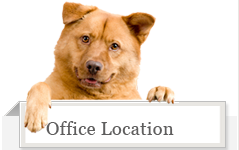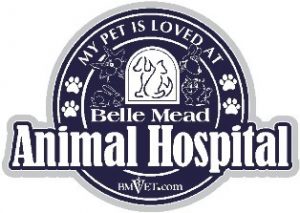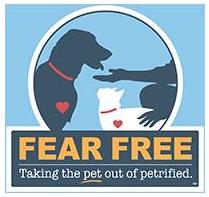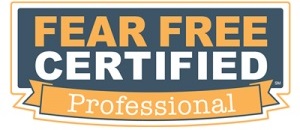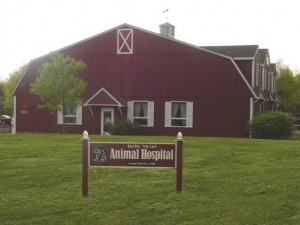
New Puppy Rules and Training Advice
Coming to your home is a big change for your new puppy when it is 6-8 weeks old and was just separated from its mom and siblings. Here is some advice.
Feed your puppy the same food he/she has been eating for a few more days before changing the puppy gradually to his/her new puppy diet. Ask us about puppy food especially for large breed pups. Very small puppies, less than 4 pounds, should be carefully watched for hypoglycemia for the first 1-2 weeks in your home. You must ensure multiple, frequent meals, have Nutrical on hand, and possibly put sugar in their water initially. All puppies are born with worms whether we see them or not. Please bring in a stool sample and we deworm pups every three weeks at least 2-3 times.
Rule #1 – Most Important
Never leave your puppy loose in the house unless you are watching them. If you do this for the next few months, your family will have a lifetime of not worrying about your dog on your furniture or accidents in the house. Remember, electrical cords kill puppies every year. So if you have to leave the room for any reason, the puppy goes with you or goes in the crate. If this puppy urinates, defecates “poops”, or chews on something it shouldn’t, you need to interrupt and redirect. Don’t rush at the puppy. Say it loud from a distance and take the puppy outside and praise it when it voids outside. We do not want to create fear anxieties. If you don’t see your puppy go “potty,” please don’t scold him/her. They do not associate scolding with the act the same way we do.
Rule #2
The crate should be large enough for the dog to get up and turn around, but not large enough to “potty” and then get away from it. Once the puppy is comfortable and healthy, eating consistently, no vomiting, no diarrhea, do not leave food and water in the crate when you can’t let the puppy out as needed. These puppies have small bladders and it’s not fair to allow them to drink a lot and hold it for 6-8 hours while you sleep. Remove their water after dinner and just let them have small amounts before bedtime until they are older.
The first two weeks you may have to let your puppy out at 3:00 a.m. to urinate, but this should improve. If not, the puppy is either developing a bad habit or may have a urinary problem. Let us know.
DO NOT talk to the puppy or go to the crate anytime your puppy is crying, especially if you know they just urinated/defecated. Otherwise you are training your puppy to cry. The key is, don’t let your puppy train you and be consistent.
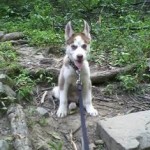 The first thing you do when you get up is take the puppy out to urinate and defecate, then feed the puppy and then take the puppy out again. Praise the dog or give him/her a treat as a reward immediately after a successful “potty”.
The first thing you do when you get up is take the puppy out to urinate and defecate, then feed the puppy and then take the puppy out again. Praise the dog or give him/her a treat as a reward immediately after a successful “potty”.
Rule #3
Teething will sometimes be a scary and frustrating time for both you and the puppy. Treat them like babies. Buy lots of chew toys that the puppy cannot ingest such as large, tightly rolled rope toys, Nylabones, etc. Take 15-30 minutes in the morning and evenings to play with your dog and their chew toys for the first few months. It makes a big difference. Never let the puppies chew on your hands even if it is very gentle and sweet. Those bad habits sometimes unexpectedly get hurtful when teething is getting out of control.
Carry these rope toys with you and put them in your puppy’s mouth when he/she is coming at you with teeth barred. If that doesn’t work, try using treats with sit commands and redirect them. If that doesn’t work, ignore them. If they are still tugging on your pant leg, pick them up and put them in the bathroom – close the door for 15 seconds and then let them out and ignore them. It that doesn’t work, put them in a time out in their crate. Usually, however, the crate is not a punishment.
Never hit the dog or dominate them physically. You don’t want to create fear aggression, especially with some dogs and certain breeds. Treat them all like a baby, use voice commands – SIT, DOWN – and you will have a great, obedient dog who will do anything for you and make you PROUD.
Rule #4
“Nothing is free” – dogs want to be directed so they can please. Teach the dog that if he sits and stays, he will get a small treat. This takes repetition for 5-10 minutes several times a day.
Also teach your kids consistently with the dog. Dogs want to play and sleep and they may treat your kids like another puppy by chasing them, teeth on them, etc. If the dogs are trained to sit and stay on command by your kids as well as yourself, you will have more control now and forever.
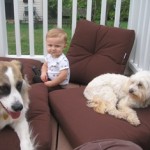 Teach your kids how to walk the dog. Initially, when you put a collar on the dog, it may feel scratchy and itchy, and you may need to pull the dog until he/she gets used to it.
Teach your kids how to walk the dog. Initially, when you put a collar on the dog, it may feel scratchy and itchy, and you may need to pull the dog until he/she gets used to it.
The puppy should not be exposed to public places, other dogs, or anywhere except your home and your yard until the dog has had at least 2 puppy distemper/parvo shots usually about 12 weeks of age. We highly recommend Puppy School at about 14-16 weeks of age for socialization and fine tuning of training.
Rule#5
We recommend feeding your puppy three times a day if possible. Once they get spayed or neutered, you can stop the middle meal and feed them 2 times a day.
– Small dogs are fed 1/4 – 1/2 cup at a time
– Medium dogs are fed 1/2 – 1 cup at a time
– Large dogs are fed 1 – 1 1/2 cups at a time
Large dogs need to be fed puppy food for large breeds. The Belle Mead Animal Hospital staff can help you find good quality, natural, and holistic type foods.
Read as many books as possible. Some recommended reading are:
Good Owners, Great Dogs by Brian Kilcommons
Leader of the Pack by Nancy Baer and Steve Deno
Also, visit www.dogwise.com for a large selection of books on specific breeds, training, and supplies.
Enjoy and have fun with your puppy!!!



